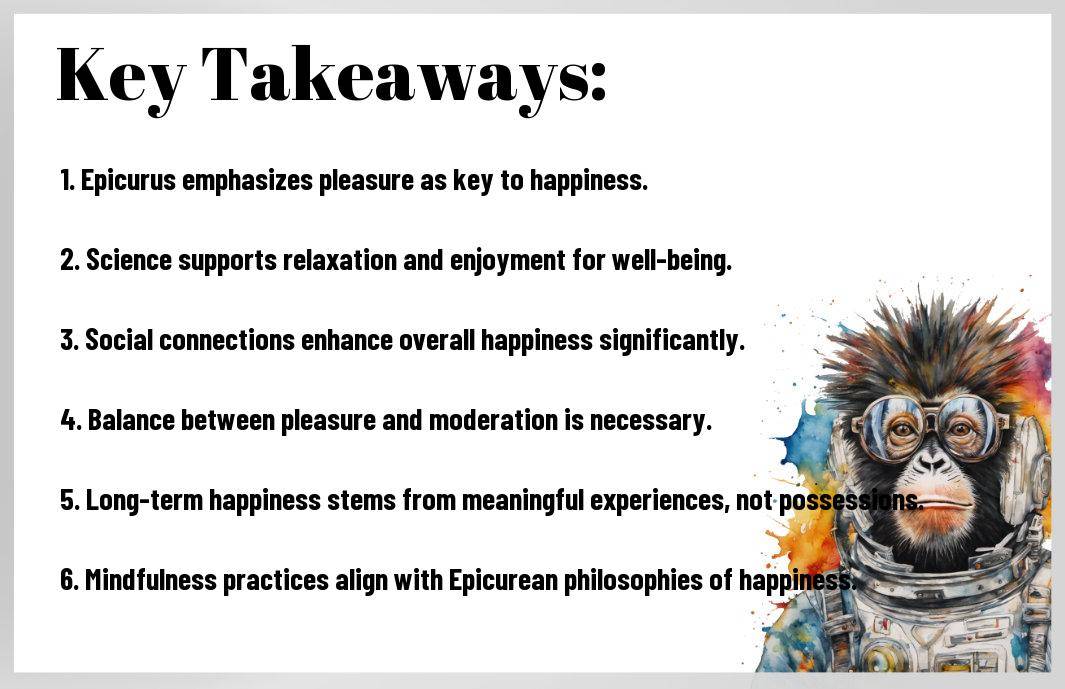
Newsletter Subscribe
Enter your email address below and subscribe to our newsletter

Enter your email address below and subscribe to our newsletter

Epicurus believed that happiness is the ultimate goal of human life, and I often find myself pondering whether modern science aligns with this ancient philosophy. In this post, I’ll explore the connection between Epicurean thought and contemporary research on happiness. Together, we’ll investigate what brings true joy and how you can incorporate these insights into your own life for a happier existence.

Before diving deeper into the philosophies of Epicurus, it’s key to understand that he lived in ancient Greece and spent much of his life exploring what it means to live well. For Epicurus, happiness was not a fleeting indulgence but something far more profound. He advocated for a life where pleasure is sought wisely and pain is minimized, creating a blueprint for personal well-being that remains relevant even in today’s complex world.
Behind Epicurus’s philosophy lies a nuanced view of pleasure. He differentiated between different types of pleasures—those that are physical and those that stem from the mind. While physical pleasures can be short-lived, the pleasures of the mind, such as friendship, knowledge, and appreciating beauty, tend to offer lasting happiness. I find it fascinating how Epicurus encourages us to seek intellectual and emotional fulfillment alongside our physical desires, emphasizing that a well-rounded approach to pleasure leads to a happier life.
Epicurus argued that tranquility is crucial for achieving true happiness. He believed that by minimizing desires and cultivating a peaceful mind, one could experience a more profound sense of contentment. I often think about how in our fast-paced world, tranquility can feel elusive, yet it’s precisely this calmness that allows for deeper contemplation of what genuinely matters in our lives.
Indeed, tranquility is not merely the absence of chaos but a state of being that allows you to enjoy life’s simple pleasures without distraction. Epicurus suggests that focusing on what we already have and finding joy in simplicity can create a more fulfilling existence. In a world often filled with noise, practicing tranquility can help guide us back to what truly brings us happiness, allowing our lives to be a source of joy rather than stress.

Clearly, the exploration of happiness today intersects richly with findings from science. Researchers from various fields, including psychology and neuroscience, have dedicated significant energy to unraveling what truly makes us happy. From understanding our brain’s response to positive stimuli to the strategies we employ for enhancing joy, the landscape of happiness studies has opened a plethora of insights. By examining the convergence of Epicurean thought and modern scientific perspectives, you might discover actionable pathways to elevate your sense of well-being.
Modern psychology offers valuable insights into happiness that sometimes echo Epicurus’ emphasis on simple pleasures. Studies suggest that cultivating gratitude, forming strong relationships, and engaging in meaningful activities are pivotal components of lasting happiness. Interestingly, practices like mindfulness and the pursuit of goals that align with one’s values can also have a profound impact. If you explore deeper into these findings, you may uncover habits that could enrich your own happiness.
At the biological level, numerous studies indicate that our genetics and brain chemistry play significant roles in influencing our happiness. For example, neurotransmitters such as serotonin and dopamine are crucial for regulating mood and emotional well-being. Additionally, factors such as hormonal balance and physical health can also contribute significantly to how we feel day-to-day. Understanding these biological underpinnings can empower you to make informed choices about lifestyle changes that may enhance your happiness. The following aspects often emerge in discussions about happiness:
Perceiving these biological connections can lead to practical actions you can take to improve your happiness.
This holistic view reveals that while happiness can be influenced by our thoughts and behaviors, our biology also plays a fundamental role. By prioritizing wellness in aspects like sleep, nutrition, and physical activity, you set yourself up for a more positive emotional state. The interplay of these factors highlights how multifaceted happiness can be. Consider these points as you seek to boost your overall happiness:
Perceiving how these elements work together might reveal new approaches to enhance your journey towards happiness.

Your journey towards happiness often weaves through the texture of pleasure and satisfaction. The philosophies put forth by Epicurus suggest that pleasure is integral to achieving happiness, yet the interplay between the two is complex. As we navigate through our choices and experiences, it becomes apparent that not all pleasures contribute equally to lasting happiness. Understanding how immediate gratification contrasts with enduring fulfillment can significantly shape our approach to life and contentment.
At times, I find myself torn between the allure of short-term pleasures and the deeper, more meaningful satisfaction derived from long-term goals. Short-term satisfaction can feel incredibly rewarding, whether it’s indulging in a favorite dessert or binge-watching a captivating series. However, these fleeting moments may not always lead to enduring happiness. I often think about how pursuing long-term goals, like building relationships or personal growth, tends to offer a more profound sense of fulfillment, even if the path is less exciting in the moment.
Besides reflecting on satisfaction, I’ve come to understand that emotional well-being plays a pivotal role in the discussion of happiness. Emotional well-being is like a sturdy foundation upon which my sense of happiness can flourish. It encompasses how I respond to life’s challenges, manage stress, and cultivate positive relationships. Focusing on nurturing my emotional health allows me to experience not only pleasure but also the deeper connections and joys that truly enrich my life.
This realization becomes even more vivid when I consider how emotional well-being interacts with the pleasures I seek. When I’m emotionally balanced, I’m more likely to savor the simple joys—like a sunset or a warm conversation with a friend—rather than just chasing after transient pleasures. I’ve found that prioritizing my emotional health enables me to not only enjoy the moment but also build a foundation for ongoing happiness that resonates far beyond instant gratification.
For many people, Epicurus is often misunderstood, especially when it comes to his philosophy on happiness and pleasure. I find it fascinating how often his ideas get mischaracterized, leading to a skewed understanding of what he really advocated. The confusion usually stems from a lack of distinction between hedonism as a philosophical framework and the more trivial notion of pursuing excess or indulgence. When I research deeper into Epicurus’s teachings, it’s clear that he emphasized a thoughtful and moderate approach to pleasure, one that enhances the quality of life rather than detracts from it through reckless overindulgence.
One of the most persistent misconceptions about Epicurus is that he promoted hedonism in the sense of seeking out any and all pleasures without restraint. I’ve often encountered this idea, and it makes me think about how easily people overlook the nuance in his teachings. Epicurus actually distinguished between higher and lower pleasures, advocating for the pursuit of mental and spiritual enjoyment over fleeting physical sensations. In my exploration of his philosophies, I’ve come to understand that true hedonism, according to Epicurus, is about the prudent choice of pleasures that ultimately lead to lasting happiness, rather than the pursuit of momentary satisfaction.
About the value of simple pleasures, Epicurus was an advocate for enjoying the uncomplicated joys of life. You might be surprised to learn that he placed importance on things like friendship, tranquility, and the beauty of nature, which often go overlooked in our fast-paced world. When I think about what brings me genuine happiness, it often stems from these very simple experiences, rather than extravagant indulgences. Epicurus’s philosophy reminds us that the richness of life can often be found in small, everyday moments, encouraging us to appreciate what we have rather than chase after more.
Misunderstandings surrounding Epicurus often lead to the dismissal of the deep insights he offers regarding fulfillment. Rather than reminding us to chase after extravagant pleasures, he nudges us to find contentment in what is readily available—like sharing a meal with friends or enjoying a peaceful moment in nature. This emphasis on simple pleasures serves as a valuable reminder for us today, especially as we navigate a society that sometimes glorifies excess and constant stimulation. By embracing the philosophy of Epicurus, I believe we can cultivate a deeper appreciation for the small things that enrich our lives on a daily basis.
Many readers may find it fascinating to explore how ancient philosophies about happiness, particularly those proposed by Epicurus, resonate with contemporary scientific research. The ancient Greek philosopher emphasized the importance of simple pleasures, friendship, and the pursuit of knowledge in fostering a fulfilling life. Interestingly, modern studies in psychology often arrive at similar conclusions, highlighting how relationships, mindfulness, and savoring everyday moments contribute to overall well-being. This synchronicity between Epicurean thought and current scientific findings encourages me to reflect on how I approach happiness in my own life.
Across the ages, there has been a recurring theme in the quest for happiness: the idea that true contentment stems from within and is influenced by our external interactions. Epicurus valued pleasure, particularly the pleasure derived from friendship, while modern psychology emphasizes social connections as one of the primary predictors of happiness. Furthermore, both perspectives advocate for moderation over excess, suggesting that sustainable happiness can be found in appreciating the little things rather than indulging in fleeting thrills. It’s enlightening to discover how these overlapping concepts from different eras inspire me to cherish my relationships and live with intention.
Aligning these philosophies with practical strategies can be a game-changer in how I structure my day-to-day experiences. For instance, integrating mindfulness practices into my routine can enhance my ability to savor moments, just as Epicurus suggested focusing on simple pleasures. Incorporating regular social gatherings or small acts of kindness into my schedule not only strengthens my bonds with others but also infuses my life with joy, reinforcing the importance of community as advocated by Epicurus. These actionable insights create a rich tapestry of meaning and happiness in my everyday life.
Also, applying these insights doesn’t have to be complicated. I find that setting aside time each week for self-reflection helps me evaluate what truly brings me joy. Planning fun outings with friends or even simple family dinners can evoke the same happiness that Epicurus valued. I could also create a gratitude journal where I note down the little pleasures I encounter each day, allowing me to cultivate a deeper awareness of all that life offers. By actively integrating these practices, I align with both the wisdom of the ancients and the findings of contemporary research on happiness.
Considering all points, I find it fascinating how the philosophies of Epicurus resonate with some findings in modern science regarding happiness. Epicurus advocated for a life filled with simple pleasures, companionship, and the pursuit of knowledge — all aspects that align closely with what psychological research suggests leads to greater well-being. When I think about the moments that bring me joy, they often stem from appreciating life’s small delights and building meaningful relationships. It’s heartening to see that both ancient wisdom and contemporary science converge on the idea that happiness is more about quality experiences than material possessions.
Furthermore, both Epicurus and modern studies highlight the importance of mindfulness and the reduction of unnecessary desires. Acknowledging our true wants, just like Epicurus advised, can lead to a more content life. For those curious about delving deeper into Epicurus’ philosophy, I recommend visiting the Epicurus | Internet Encyclopedia of Philosophy. This exploration of his ideas might enrich your understanding of happiness and serve as a reminder that sometimes, the simplest joys can lead to profound satisfaction in our lives.
A: Epicurus believed that happiness is achieved through the pursuit of simple pleasures, the cultivation of friendships, and living a life of moderation. He emphasized the importance of inner peace and the reduction of pain as key components to attaining a fulfilling life.
A: Research in psychology supports the idea that simple pleasures, such as enjoying nature, spending time with loved ones, and engaging in hobbies, can significantly enhance an individual’s sense of well-being. Studies show that these small, everyday experiences contribute more to happiness than major life events.
A: Yes, scientific studies indicate that moderation in activities such as eating, drinking, and spending can lead to greater life satisfaction. Researchers have found that extremes, whether positive or negative, tend to lead to stress and dissatisfaction, thereby reinforcing Epicurus’s view on moderation.
A: Epicurus emphasized the significance of friendships as a source of joy and emotional support. Contemporary research aligns with this, demonstrating that strong social connections are among the most consistent predictors of happiness and longevity. Quality relationships provide both emotional fulfillment and practical support, contributing to overall well-being.
A: Yes, various scientific studies indicate that reducing physical and emotional pain can enhance individual happiness. Research shows that alleviating stress and managing pain lead to improved mental health outcomes, aligning with Epicurus’s belief that minimizing suffering is necessary for achieving a happy life.
A: Definitely. Many therapeutic approaches, like Positive Psychology, advocate for the pursuit of meaningful relationships, mindfulness, and the enjoyment of simple activities—principles that echo Epicurean thought. Therapists often encourage individuals to identify and engage in activities that yield joy and satisfaction over time.
A: While Epicurus’s ideas on happiness have found support in contemporary science, some critics argue that his emphasis on pleasure may overlook the complexities of human emotions. Modern psychology recognizes that individuals may find happiness in various experiences, including challenge and growth, which can sometimes involve discomfort or sacrifice, contrasting with Epicurean ideals.